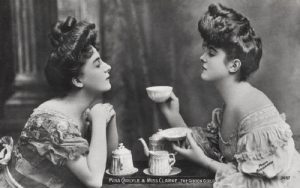
Death Cafe write-up: October 2015
Something that always amazes me is how quickly our monthly Death Café Marrickville rolls around. When I see familiar faces it seems as though we just gathered together a week or so ago, while another delight is learning more about death, dying and the afterlife through the eyes of other people and their experiences. As always, people attend a Death Café for various reasons, and our October Death Café, which coincided with Halloween, was no exception.
As we sat together in our usual haunt, no pun intended, our conversation seemed to have a sociology flavour to it as we explored our cultural and social attitudes toward death, dying and bereavement. Why is there such variance in how we interpret and make sense of death? How do culture-specific rituals and social mores arise? What influences one person to grieve in a certain way while for another it can be completely different? Is the notion of an after-life simply a vain and insubstantial hope for something better than what we’ve had while living?
We also explored the concept of reincarnation, with one person mentioning that the world’s population at the beginning of the century was 1 billion which has increased to 6 billion. If reincarnation is the cyclic return of a person’s spirit, wouldn’t population numbers remain somewhat constant? Why is the population increasing, where are all the people coming from? It was an interesting question which had us all thinking and examining our own attitudes toward reincarnation.
Other people talked about death-related events and happenings. One person had attended a demonstration by Esther and Jerry Hicks, who channel “Abraham”, a group of non-physical entities, while I had completed a Midwifing Death course which I had commenced at the beginning of the year.
There is a growing presence in the media regarding conversations and issues relating to euthanasia or assisted dying, and the very real moral dilemma which so often polarises people to either be for or against such a decision. What is legal and what is moral? This was another question we grappled with. Someone had brought along a copy of Telling it Straight. Written by John Edge and published in 2006, it tells the story of the voluntary euthanasia movement through the life experience of the death of Nancy Crick, who eventuated a peaceful death for herself on 22 May, 2002.
On page 339, Edge wrote, “The religious fraternity has achieved a major victory, as enlightened, rational discussion or correspondence on death and dying has become a thing of the past”. I would beg to differ and if the response to the ABC’s recent Q&A program, “Facing Death”, is anything to go by, the issue of assisted death is very much positioned within the present. My own feelings and thoughts regarding this are influenced by the experiences of my husband when he was battling bone cancer.
As his primary carer I supported him through his journey from diagnosis to death. It was devastating emotionally, spiritually, physically and psychologically for both of us, and I will never in all my days forget his words, “If I had a gun I would shoot myself just to stop the pain”. He didn’t have a gun, nor did I, and he eventually died in my arms during that phase of terminal illness known as palliative sedation.
In the assisted death arena, what is legal and what is moral? Should the issues involved in such decisions be considered from the spirit of the law, or the letter of the law? And in making those decisions, either for ourselves or for others, whose voice is it that we’re listening to, theirs or ours?
The Death Café movement has its origin in Café Mortel which was started by Bernard Crettaz as a sociological experiment in 2004 in the Restaurant du Théâtre du Passage in the Swiss town of Neuchâtel. In the last three years, there have been over 1,400 death cafés in 26 countries around the world (see Jon Underwood’s website, deathcafe.com). People want to talk about death. They want to understand the issues involved in a rational and intelligent way and they want to be able to do that in an environment which encourages the exploration of ideas, which provides opportunities to learn, and which promotes death literacy.
Dying to Know Day, is an annual day of action dedicated to bringing to life conversations and community actions around death, dying and bereavement. The slogan for this year’s event was, “Talking about death is part of life!” It is, and Death Cafes play a vital role in enabling people to do just that.